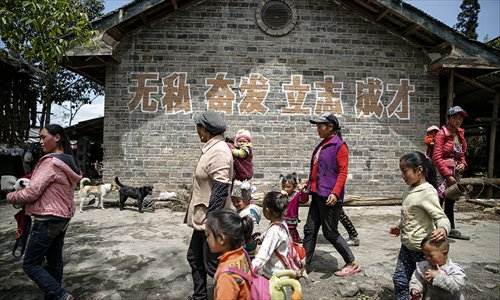Facing layoffs, one-child policy enforcers fear being thrown onto scrapheap after reform

Villagers walk with their children in Xiaoliangshan, Southwest China's Sichuan Province. Photo: IC
Peng Yulong was blinded 26 years ago by an explosion caused by an angry villager during a raid to enforce the one-child policy. He has spent the years since then asking the government for compensation.
"I was disabled while doing a public job to enforce State policies. The government should compensate me," he told the Global Times. Now a masseur in Xingwen county, Southwest China's Sichuan Province, he dedicates most of his spare time to his hunt for compensation even though he has been told every time that there is no policy that covers his situation, as he was a village official rather than a government official. As of today, there seems to be little hope he will ever receive compensation.
Aside from the local authorities, he has also gone to Beijing to make appeals to the central government. His grievances were reported by the national media in February, but received little public attention. Some netizens even commented that he "deserved the outcome." Peng, a former family planning official left out in the cold, is far from alone.
As China has reformed its family planning policy and streamlined this branch of the government, thousands of grass-roots family planning officials have been transferred to other departments or made redundant.
It was announced in March 2013 that the National Population and Family Planning Commission, a ministerial-level department established in 1981, would merge with the Ministry of Health.
In December that year, the country took its first steps to relaxing the one-child policy, allowing couples to have a second child if either parent was an only child. On January 1, the policy was further loosened to allow all couples to have two children.
Seeing their salaries and benefits cut, some family planning officials wrote open letters or even staged protests. However, unlike other petitioners or laid-off workers who usually receive public sympathy and support when faced with adversity, they have largely drawn ridicule and antipathy. Many say they are being repaid for their past "evil" acts.

Career shame
In late May, dozens of family planning officials in Gong'an county, Central China's Hubei Province, staged a protest in front of the county bureau of health and family planning, demanding better wages. They claimed their monthly salary had been cut to less than 2,000 yuan($303), half of what most civil servants can expect to be paid.
One of them shared pictures of their protest and written appeals on Weibo, hoping to draw attention and support. Though the post was widely reposted, however most netizens showed little empathy toward their complaints.
Yi Fuxian, author of non-fiction work A Big Country in an Empty Nest which argues that the birth control policy has hurt China, thinks this kind of reaction clearly shows how much the public dislikes the way that the country's family planning policies have been enforced.
"Under the call of the government, the family planning officers were empowered to use coercive measures and collect fines, which generated lots of resentment," Yi, senior scientist of Obstetrics & Gynecology at the University of Wisconsin-Madison in the US, told the Global Times.
In the 1980s and 1990s, population control was at the top of local governments' and village committees' agendas. In urban areas, couples could lose their jobs if they had more children than they were allowed. In rural areas, families who wouldn't or couldn't pay fines would have their property confiscated and sold by family planning officials, including livestock, furniture and appliances.
Faced with losing so much of their already meager wealth, forced abortions and sterilizations, villagers across China became hostile to family planning officers.
During that period, family planning officials were regularly attacked, sometimes fatally, by villagers.
On June 18, 1990, Peng, then an official in Xinyi village, Xingwen county took part in a raid along with superior family planning officials who were in the village to investigate and penalize one-child policy violators.
At noon, a coal miner whose wife had been forced to abort their third child and had had his pig confiscated, set off explosives which killed him and six others in addition to injuring 21, one of whom was Peng.
Of the 28 killed or injured, 26 were innocent villagers between 6 months and 58 years old. Besides paying funeral fees, the government abandoned the injured after offering them initial medical treatment, according to news-probe, an investigative unit under news portal qq.com.
Layoff crisis
Zheng Gejun, director of a family planning service center in a Gong'an county township who participated in the May protest, feels that he and other family planning officials have been wrongly demonized.
"The job was filled with hardships. We had to go to villages and make door-to-door visits," Zheng, 45, who has been in the family planning field for more than 20 years, told the Global Times. "We were responding to the government's call. It was hard to complete our task unless we took administrative measures."
In this context "administrative measures" means forcing people to follow government policies.
He claims that the number of forced abortions and incidents of violent policy enforcement drastically dropped after the late 1990s and individual negative reports have demonized his profession as a whole.
Now that the policy has changed, people like Zheng feel that they have been abandoned by both the country and its people.
Such feelings are not rare. In January, family planning workers in Xingning, South China's Guangdong Province, wrote a joint open letter titled "Please give family planning workers a way out," complaining about unfair treatment and layoffs.
They wrote that they had been asked to integrate into local healthcare centers which are not fully funded by the government. The majority of them are middle-aged and lack the medical qualifications which healthcare centers require all their employees to have, according to the letter.
They said the arrangement has made them feel like the proverbial "donkey which is killed the moment it leaves the millstone."
Huang Minghui from Xinning county, Hunan Province, says he is glad he left his job at a township family planning office five years ago.
He took the job in 2003 when the office had more than a dozen workers. But now, only two or three remain. "I heard that the government has reduced their staff quota, and some even rumor that the office will be closed. Sensing the crisis, most of my former colleagues have left or jumped to other departments," Huang told the Global Times. In 2011, he sat the civil service exam and was recruited by a nearby township government.
Parenting trainers
Li Jianmin, a professor of population studies at Nankai University, argues that the government should accept its responsibility to people like Peng and Zheng.
"The victims like Peng and the layoffs or job transfers facing family planning workers are all a legacy of the one-child policy period. The government should give them a proper solution," Li told the Global Times.
Shi Yaojiang, professor at Shaanxi Normal University's Center for Experimental Economics in Education, believes it would be a great loss to throw China's 1 million family planning officials onto the scrapheap.
"Their function was to control the population size and raise population quality. But before, we focused on the former task. Now, it's time for us to shift the focus to the latter," Shi told the Global Times. He has led a program to help family planning workers become "parenting trainers" in Shangluo, Northwest China's Shaanxi Province since 2013.
"Our survey showed that more than half of the children in poverty-stricken families suffer from malnutrition and slow physical and mental development," he noted. "In the US, there are about 2 million people engaged in infant development guidance. But in China, there are almost no government-backed personnel in this sector."
Li Bo, 33, who became a family planning officer in Shangluo in 2005, is happy to have found a new role. He joined Shi's program and has become one of 130 parenting trainers in Shangluo, who occasionally visit rural families to distribute nutritional supplements, hand out toys and teach parenting skills.
"Instead of resentment, the villagers show us respect," Li told the Global Times.
So far, family planning officials from 17 provincial-level regions have inspected the program, according to Shi. Some local governments in Yunnan and Hebei provinces have already begun to promote similar schemes in their jurisdictions, he said.
Wang Peian, deputy head of the National Health and Family Planning Commission (NHFPC), reiterated that comprehensive measures shall be taken to reduce the cost of raising children and to help children get the best start in life possible.
As many young people are less willing to have second children than their parents and grandparents were and China faces an aging society, some suggest family planning workers should encourage them to have larger families. In some communities such as Lu'an, East China's Anhui Province, neighborhood family planning committee workers have started to pay door-to-door visits to persuade couples to have more children.
However, Zhai Zhenwu, chairman of the standing council of the China Population Association under the NHFPC, said the time to encourage or force couples to have second children is yet to come. "It won't be disastrous if some couples don't have a second child." Zhai told the Global Times.
Yi estimates that China will completely terminate its birth control policy in the near future and family planning workers will have to find a new niche for themselves.
He suggests they find work in sectors such as senior care rather than engaging in prenatal and postnatal care. "It's hard for these workers, who used to be keen on birth control, to change their mindset to facilitate births," Yi said.
Zheng doesn't think they are worthless. He argued that they still play a crucial role in supervising population size and gender balance.
Li Bo echoed Zheng, saying "Beside parenting guidance, we have lot of other work to do, such as distributing birth control tools, promoting sterilization knowledge, as many couples demand this service."
Newspaper headline: Abortive careers